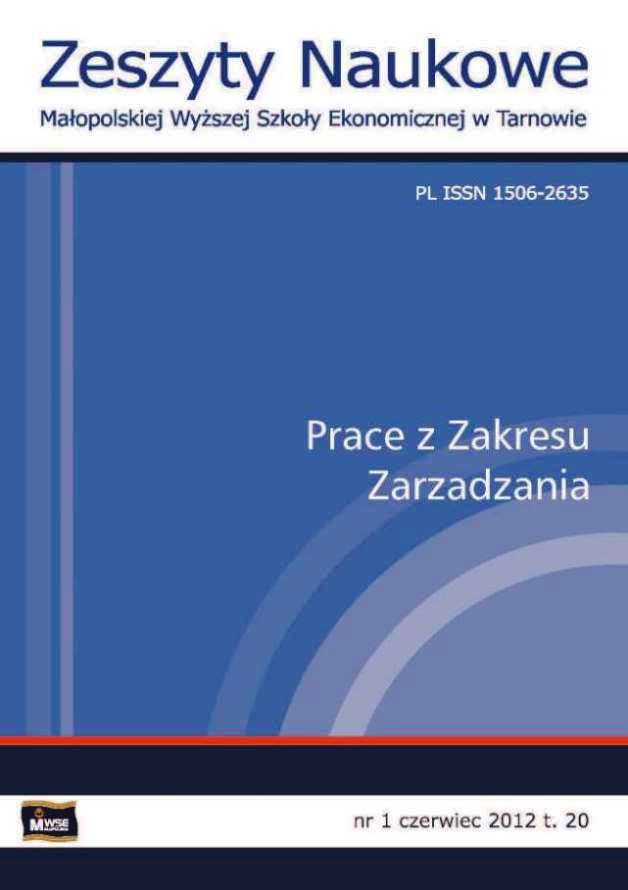Abstract
In the light of the current economic crises and cycles, the article presents views on these issues represented by Nobel Laureates in Economic Sciences. Opinions of the economists are discussed from the cognitive theory perspective, in comparison with economic situation be- fore and after the World War II. In 1969 the prestigious Nobel Prize in Economic Sciences was granted to researchers of macroeconomics, among others. In the discussed context, their views represent two orthodox schools discussed in this paper—Keynesian economics and monetarism. In the continuation and elaboration of the study, two new options are presented: the new Keynesian economics school and the new classical economics school. The subsequent part of the discussion is devoted to financial crises and their relation to business cycle, as well as the present financial situation in Poland.
References
Barczyk R. [et al.], Nowe oblicza cyklu koniunkturalnego, PWE, Warszawa 2006, ISBN 83-208-1654-8. s.25
View in Google Scholar
Barczyk R., Pojęcie i geneza współczesnego kryzysu finansowego w świetle teorii i cyklu koniunkturalnego. W: A. Prusek (red.), Nauki ekonomiczne wobec wyzwań współczesnej gospodarki światowej, Wyd. Uniwersytet Ekonomiczny w Krakowie, Kraków 2010, s. 87-104.
View in Google Scholar
Belka M., Polityka makrostabilnościowa jako konieczny element stabilizowania koniunktury, referat wygłoszony na VI Kongresie Ryzyka Bankowego, 15.11.2011 r., Centrum Nauki Kopernik w Warszawie.
View in Google Scholar
de Soto J.H., Pieniądz, kredyt bankowy i cykle koniunkturalne, Wyd. Instytut L. von Misesa, Warszawa 2009. ISBN 978-83-926160-4-7.
View in Google Scholar
Gruszecki T, Nagrody Nobla w ekonomii, Wyd. Verba, Lublin 2001. ISBN 83-87497-64-9.
View in Google Scholar
Gruszecki T, Zima Kondratiewa, „Gazeta Bankowa”, nr 49 (1101), z dnia 7 XII 2009, s. 63.
View in Google Scholar
Kalecki M., Próba teorii koniunktury, Instytut Badania Koniunktur Gospodarczych i Cen, Warszawa 1933.
View in Google Scholar
Keynes J.M., Ogólna teoria zatrudnienia, procentu i pieniądza, przeł. M. Kalecki, S. Rączkowski, Wyd. Naukowe PWN, Warszawa 2003. ISBN 83-01-14033-X.
View in Google Scholar
Plosser Ch.I., Understanding Real Business Cycles, „Journal of Economic Perspectives” 1989, Summer, vol. 3, no. 3, s. 51-77.
View in Google Scholar
Schumpeter J., Business Cycles, McGraw-Hill Book Company, New York 1939.
View in Google Scholar
Siekierski J., Kierunki rozwoju współczesnej ekonomii i jej główne kwestie metodologiczne, „Roczniki Naukowe SERiA” 2004, t. VI, z. 5, s. 88-94.
View in Google Scholar
Słojewska A., Federalny model dla euro strefy, „Rzeczpospolita” nr 150, z dnia 29 VI 2012 r., s. A8.
View in Google Scholar
Snowdon B., Vane H.R., Wynarczyk P., Współczesne nurty teorii makroekonomii, przeł. A. Szeworski, Wyd. Naukowe PWN, Warszawa 1998. ISBN 83-01-12545-4.
View in Google Scholar
Styczek D., Forum makroekonomiczne BRE Banku, „The Wall Street Journal. Polska. Dziennik Finansowy”, z dn. 13.03.2009.
View in Google Scholar
Tymoczko D., Odpowiedź banków centralnych na kryzys, „Horyzonty Bankowości”, dodatek do „Miesięcznika Finansowego BANK” 2011, nr 5, s. 10.
View in Google Scholar
© Copyright by Małopolska School of Economics in Tarnów. The articles are available under the Creative Commons Attribution NonCommercial-NoDerivatives 4.0 International License


